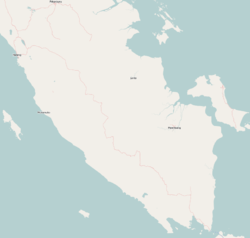Bengkulu (city)
|
Bengkulu City Bencoolen |
|||||||
|---|---|---|---|---|---|---|---|
| City | |||||||
Clockwise from top left : Fort Marlborough, At-Taqwa Grand Mosque, Thomas Parr Monument, Aerial view of Bengkulu City, and Bung Karno Seclusion House
|
|||||||
|
|||||||
| Location of the town in southern Sumatra | |||||||
| Coordinates: 3°47′44″S 102°15′33″E / 3.79556°S 102.25917°ECoordinates: 3°47′44″S 102°15′33″E / 3.79556°S 102.25917°E | |||||||
| Country | Indonesia | ||||||
| Province | Bengkulu | ||||||
| Founded | 18 March 1719 | ||||||
| Government | |||||||
| • Mayor | Helmi Hasan | ||||||
| Area | |||||||
| • Total | 144.52 km2 (55.80 sq mi) | ||||||
| • Land | 144.52 km2 (55.80 sq mi) | ||||||
| Elevation | 2 m (7 ft) | ||||||
| Population (2014) | |||||||
| • Total | 328,827 | ||||||
| • Density | 2,300/km2 (5,900/sq mi) | ||||||
| Time zone | WIB (UTC+7) | ||||||
| Area code(s) | +62 736 | ||||||
| Website | www |
||||||
Bengkulu City (Indonesian: Kota Bengkulu; English historic name: Bencoolen, Dutch historic: Benkulen or Benkoelen) is a city on the west coast of Sumatra in Indonesia. It had a population of 308,756 at the 2010 Census, the latest estimate (for January 2014) is 328,827. The city is the capital and largest city of Bengkulu Province.
The British East India Company founded Bengkulu (named Bencoolen by the British), in 1685, as their new commercial centre for the region. In the 17th century, the British East India Company controlled the spice trade in the Lampung region of southern Sumatra from a port in Banten, in the north west of the neighbouring island of Java. In 1682, a troop of the Dutch East India Company attacked Banten. The local crown prince submitted to the Dutch, who then recognised him as Sultan. The Dutch expelled all other Europeans present in Banten, leading the British to establish Bengkulu. In 1714, the British built Fort Marlborough at Bengkulu.
The trading centre was never financially viable, because of its remoteness and the difficulty in procuring pepper. Despite these difficulties, the British persisted, maintaining a presence there for over a century, ceding it to the Dutch as part of the Anglo-Dutch Treaty of 1824 to focus their attention on Malacca. Edmund Roberts, the first U.S. envoy to the Far East, visited Bengkulu in 1832. Like the rest of present-day Indonesia, Bengkulu remained a Dutch colony until World War II.
...
Wikipedia







